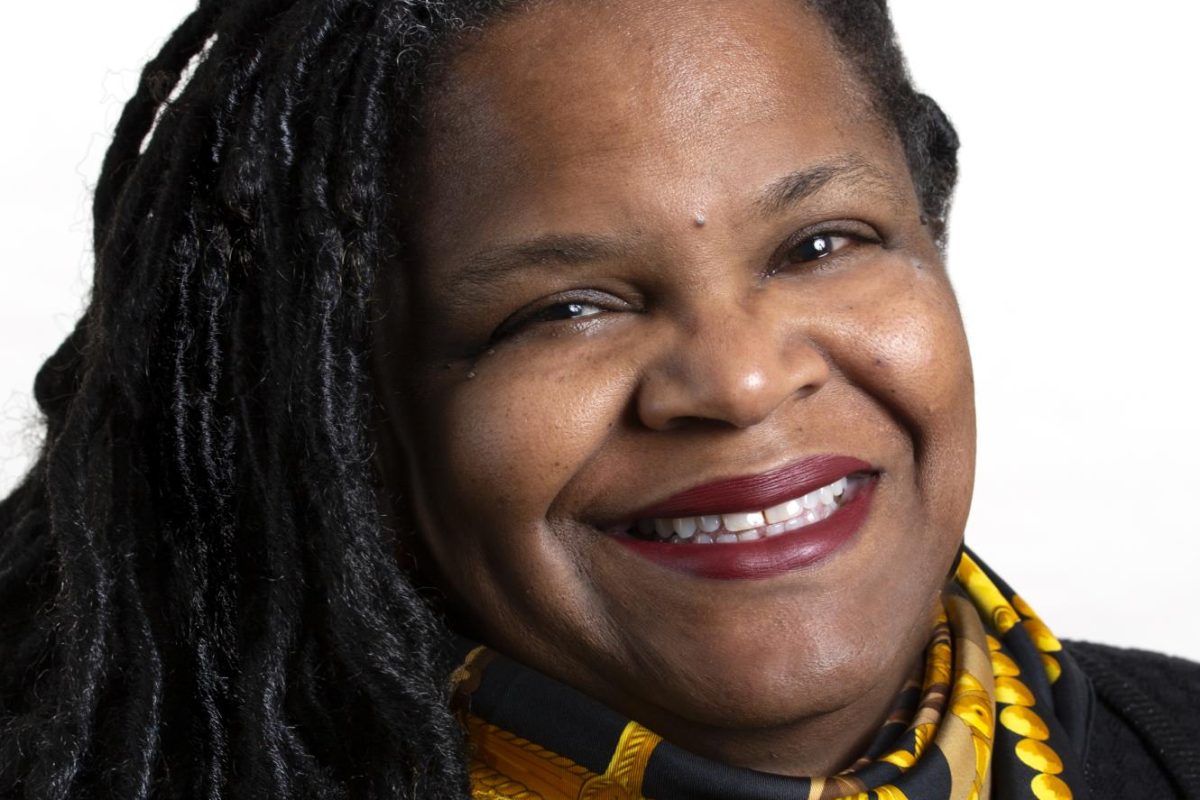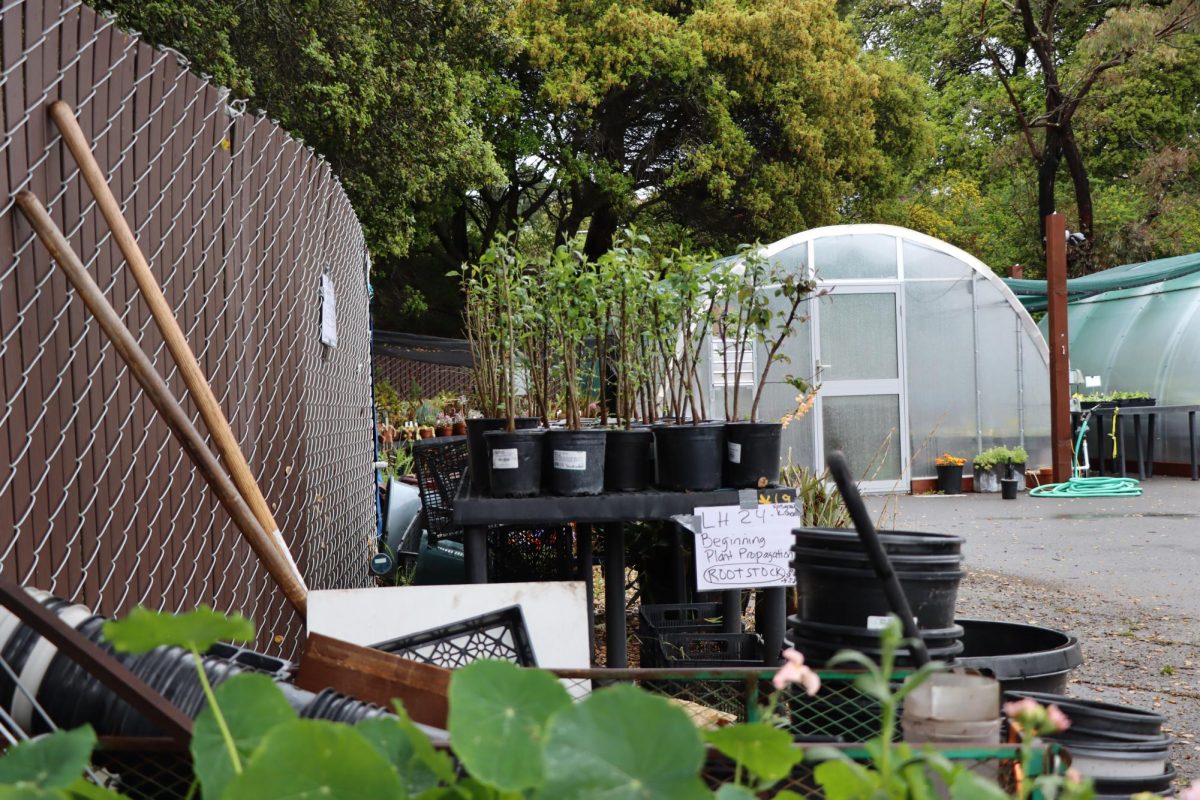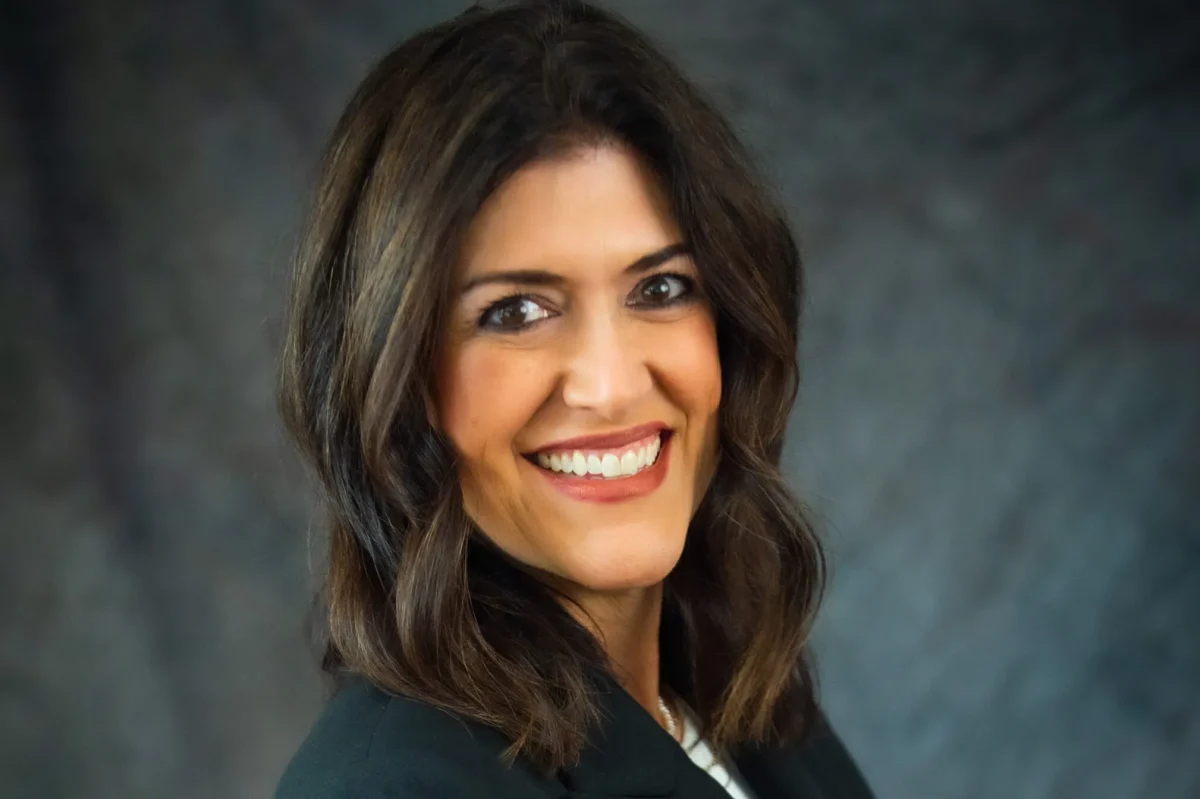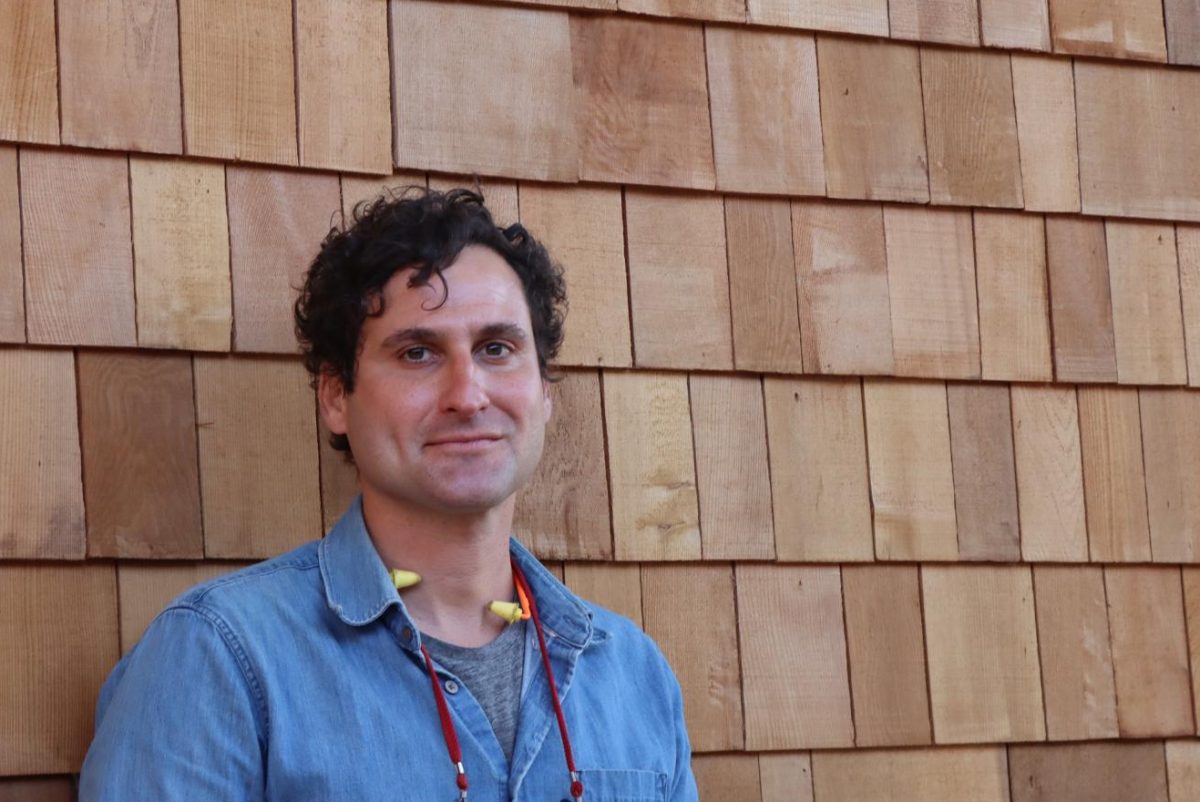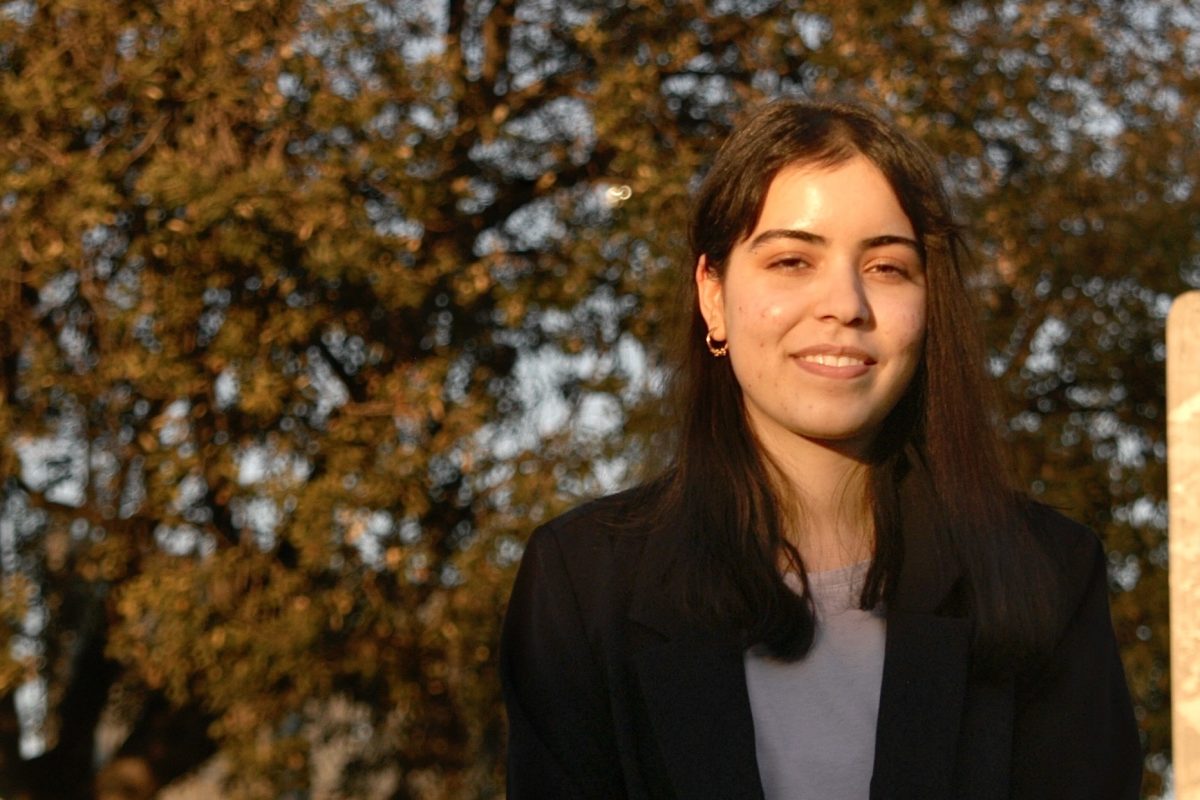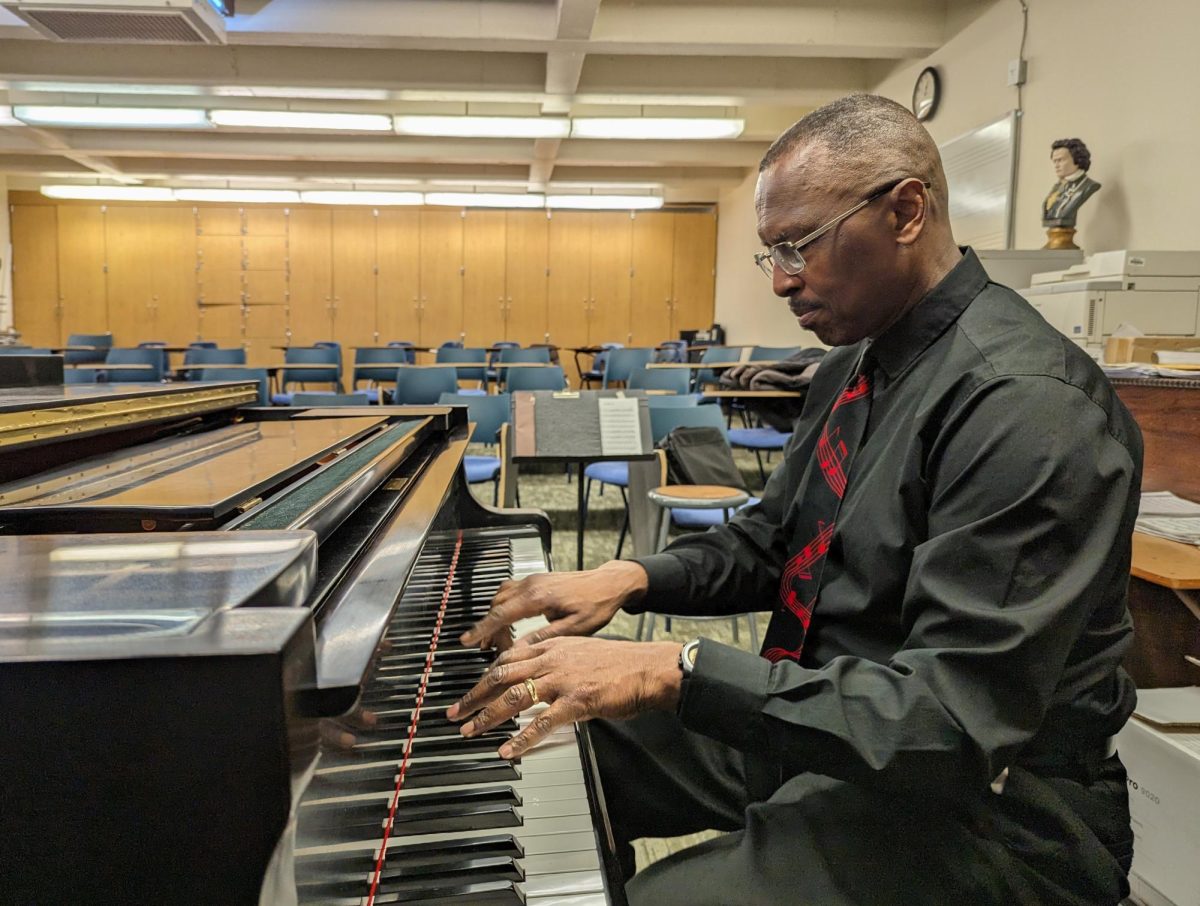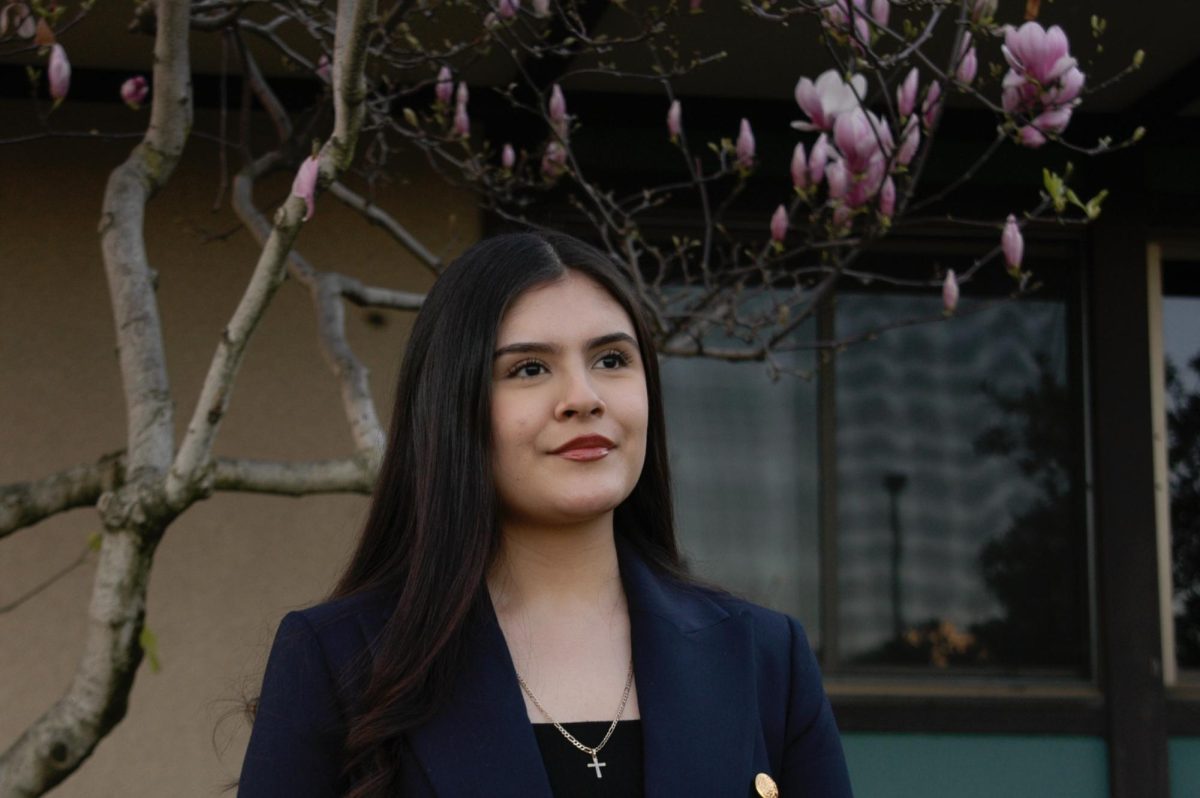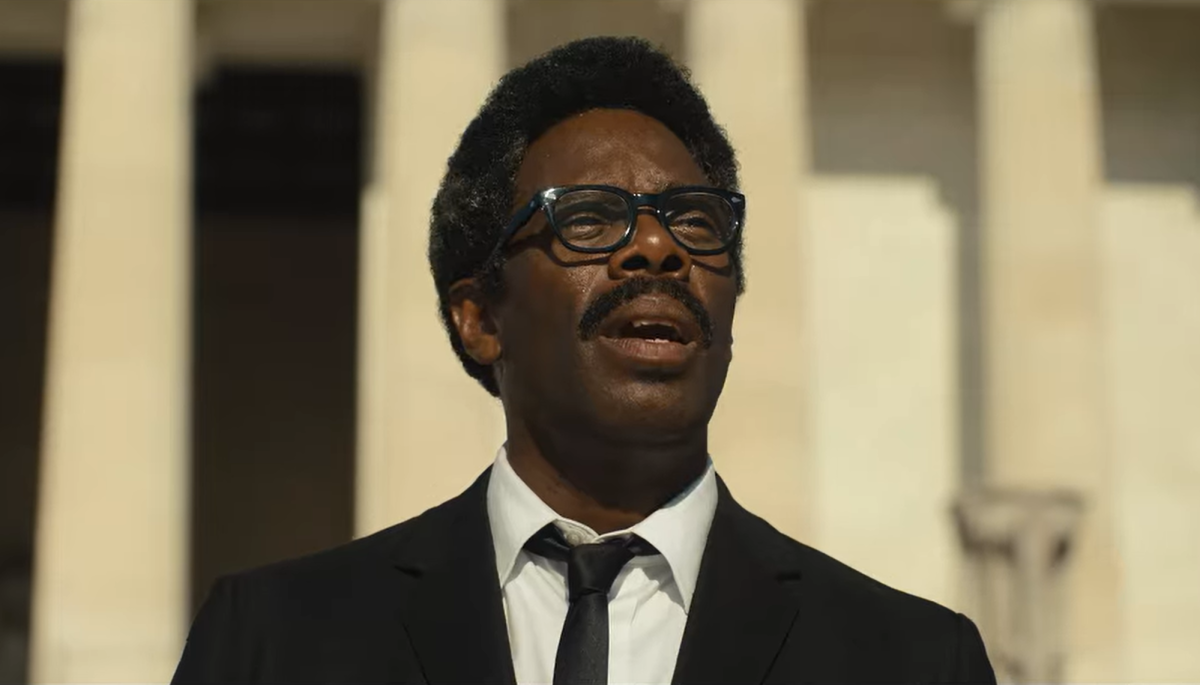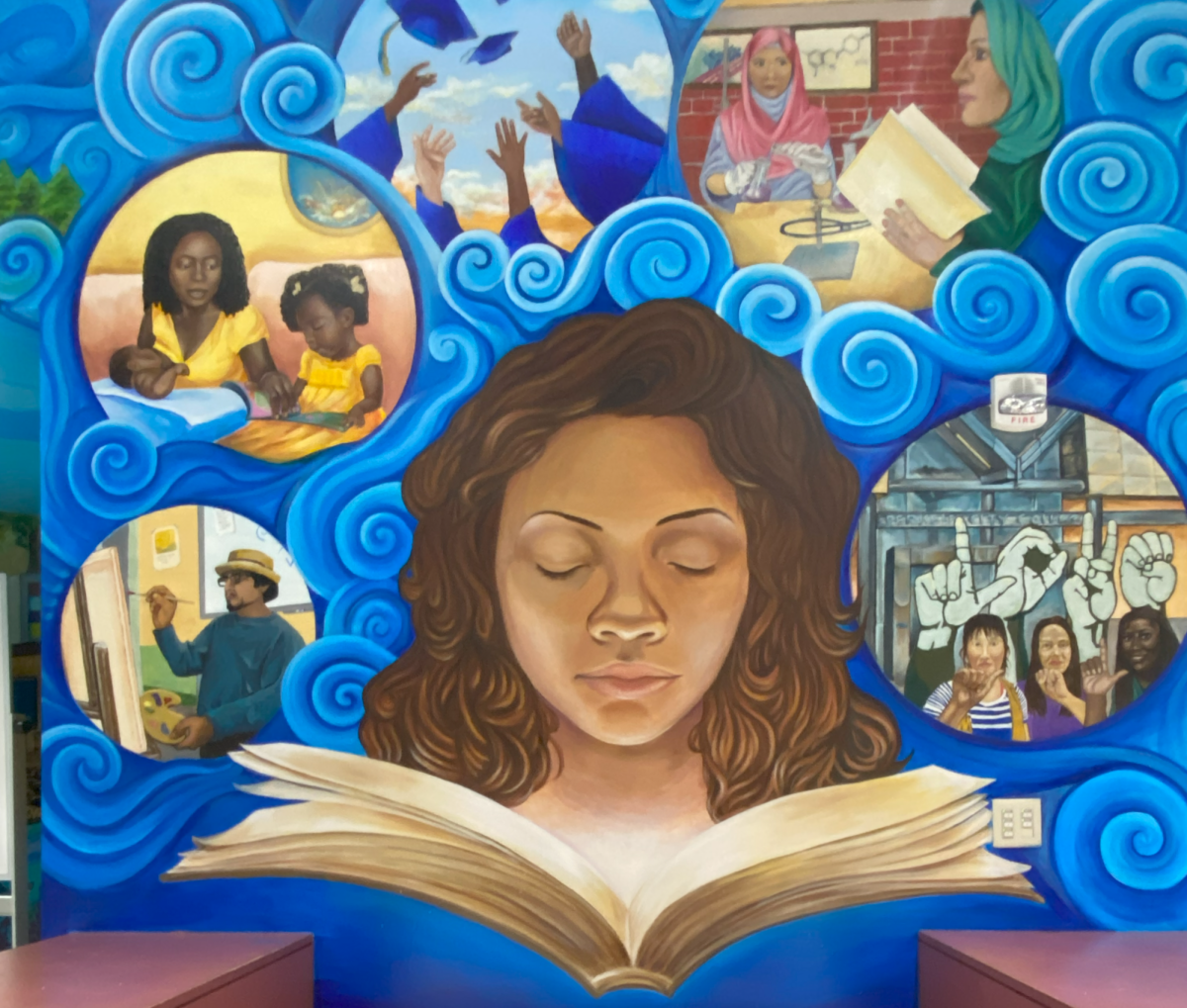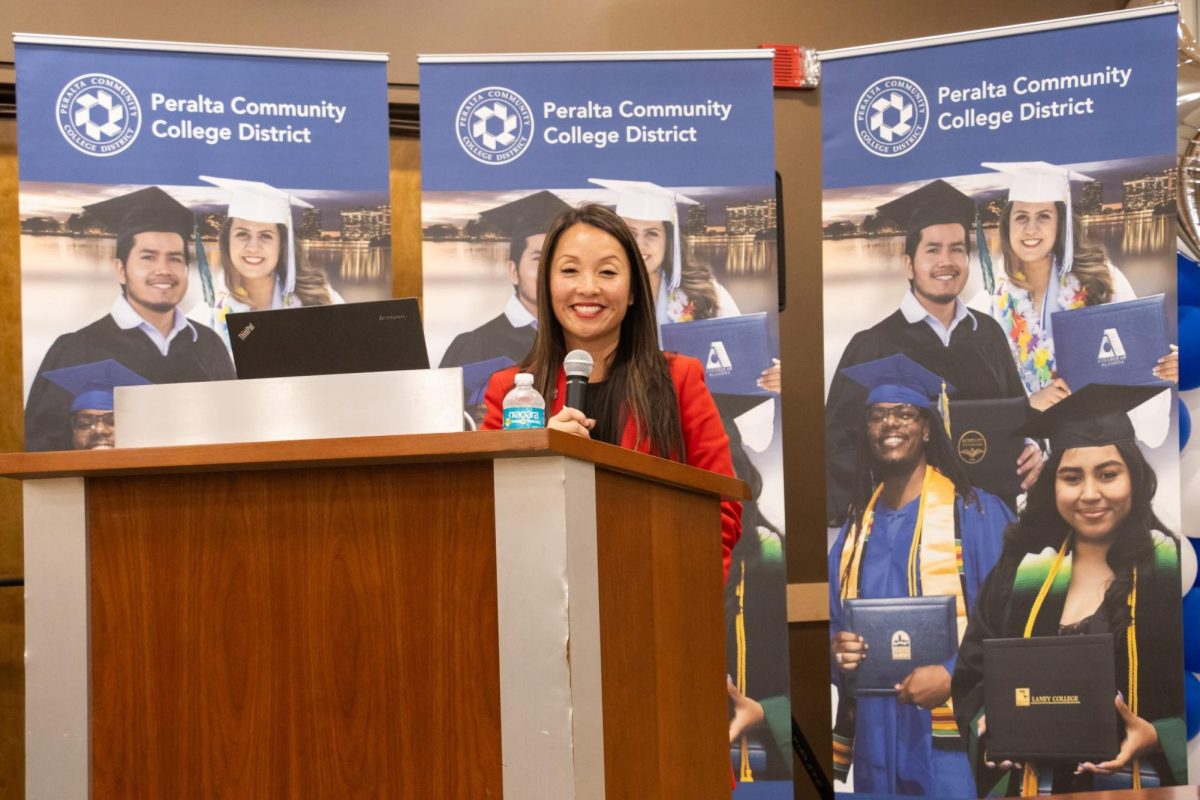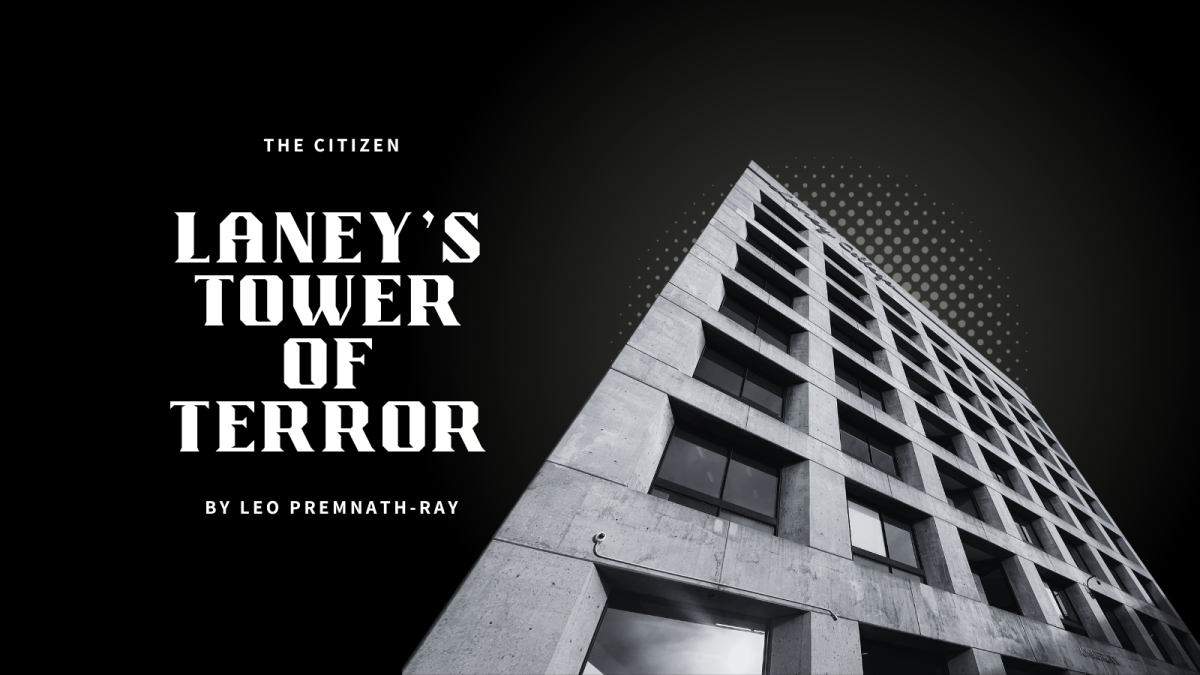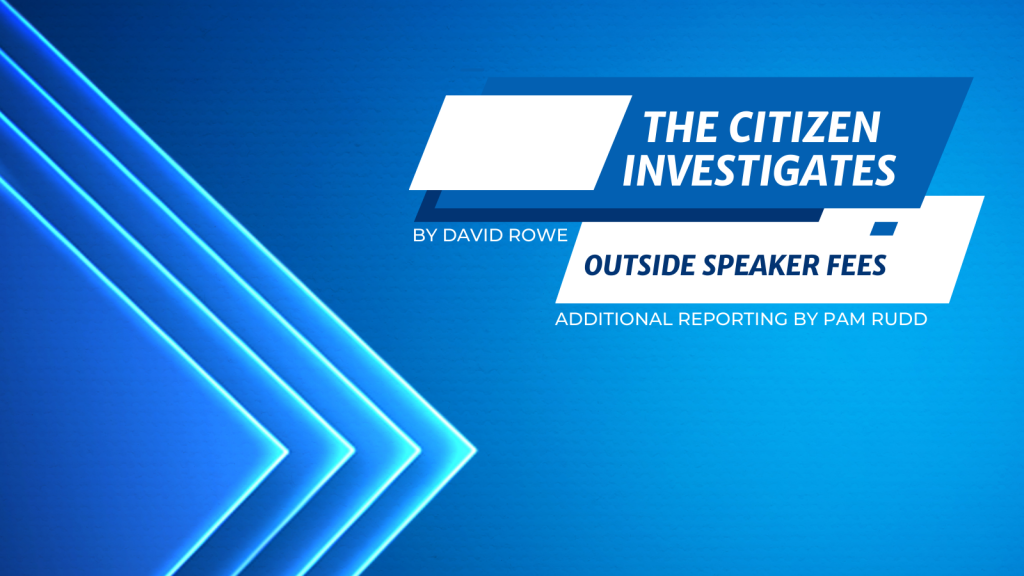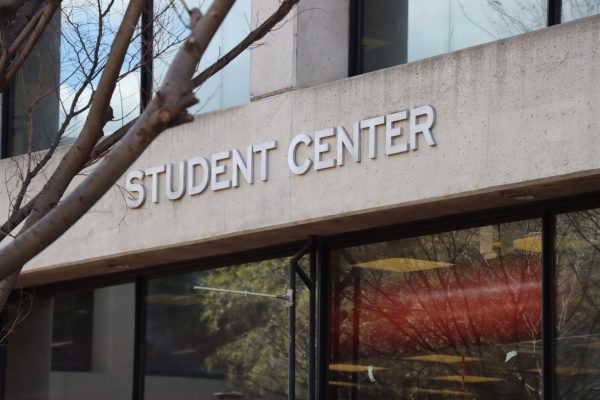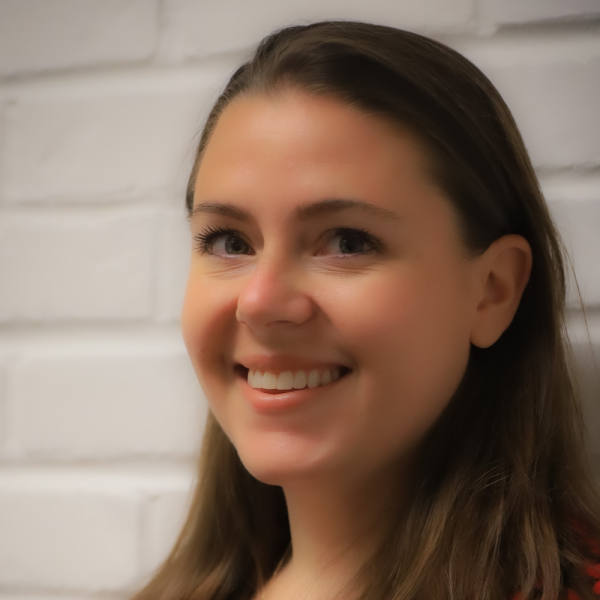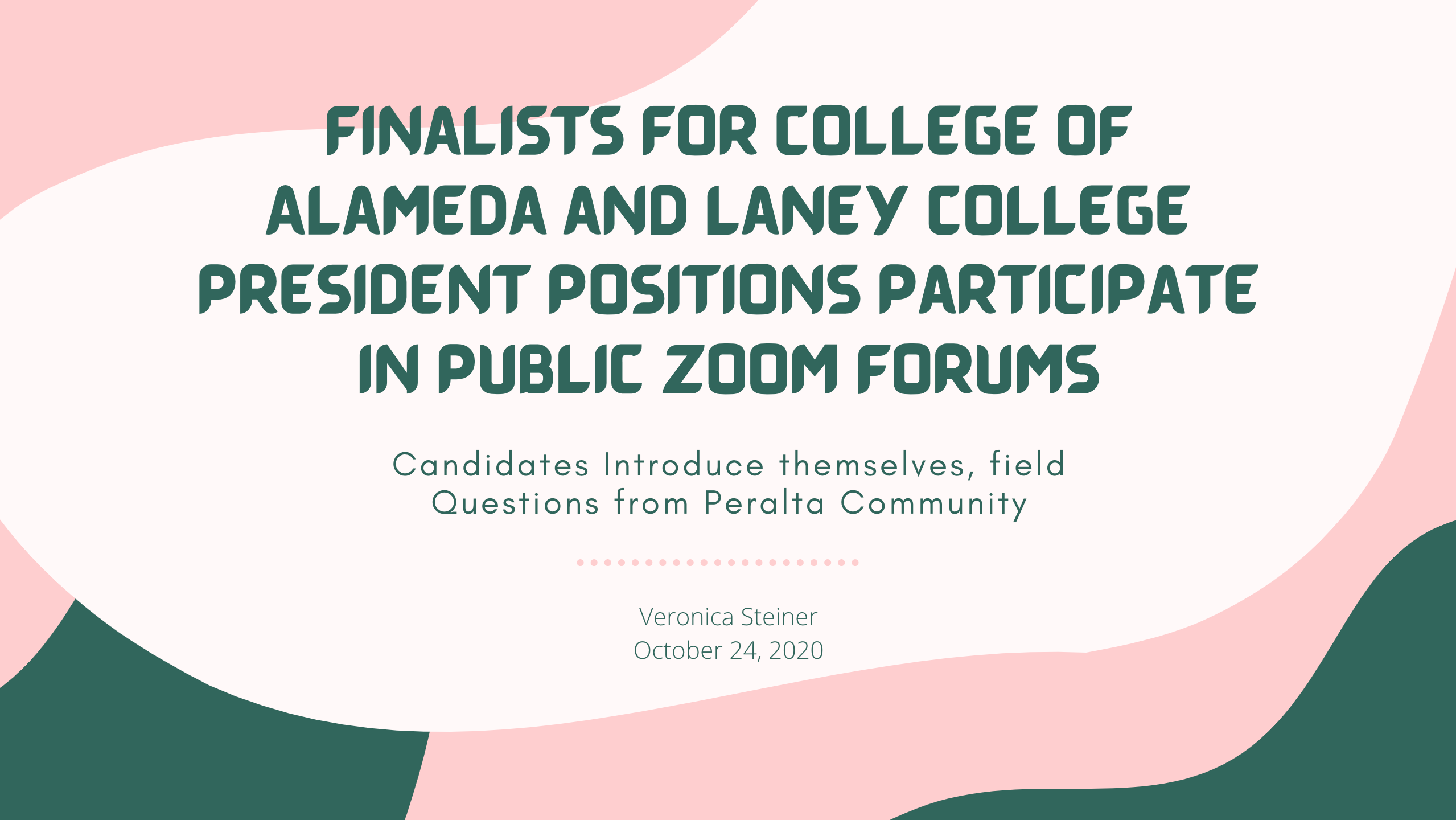
There are five finalists for College of Alameda (COA) and four finalists for Laney College hoping to be selected as the next president, with Interim Chancellor Carla Walter positioned to make the final decisions sometime soon.
Many of the candidates have been finalists for president at other colleges and one candidate is also a finalist for president at both COA and Laney College.
At a series of Zoom forums, each candidate for both colleges shared their background, qualifications and commitment. Faculty, staff, students and the greater Peralta community asked a variety of questions moderated by Mark Johnson, Peralta’s executive director of public information, communication & media. Each candidate was allotted 45 minutes to give an idea of who they are and what they would bring to the position, college and looming accreditation crisis.
~~~
College of Alameda Forums
Tina Vasconcellos
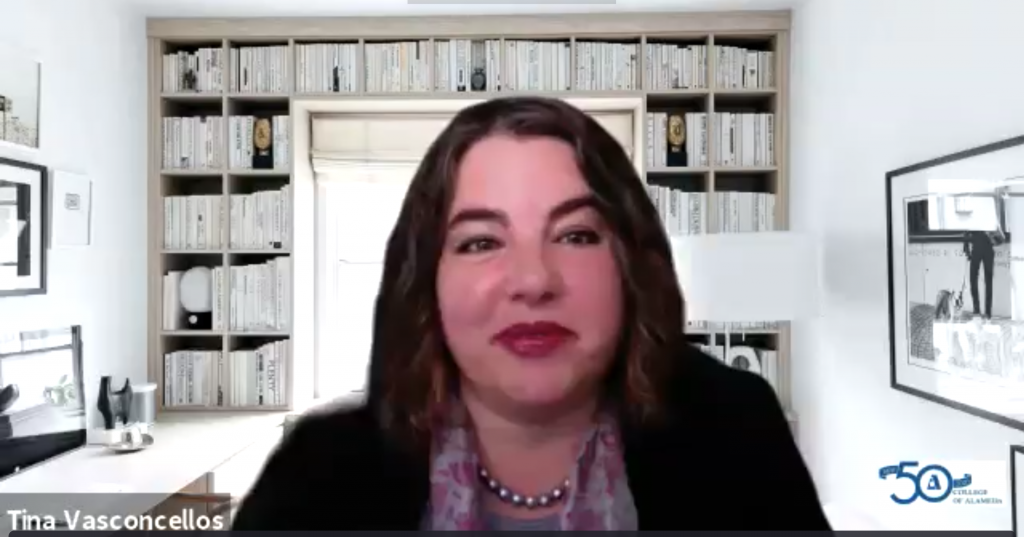
One question asked of every candidate — submitted by College of Alameda Classified Senate President Kawanna Rawlins — addressed the need for stable leadership at College of Alameda.
“We need a president that is willing to commit him or herself in this position. There were six or seven presidents over the past 20 years, which is a lot. So what is your level of commitment? And do you have plans to leave COA as a better position becomes available?”
Tina Vasconcellos said she was in it for the long haul.
“I’m here to serve. Ideally, this is my college of choice, this is my district of choice,” Vasconcellos said.
“[This candidate] needs to also be a fit for the district and leadership at the time and where we are on the issue we have at hand. I’ve been absolutely privileged to serve as an administrator here in this district for the last 13 years and faculty member for years before that, so I’m pretty committed.”
When asked if she is in favor of or opposed to the state takeover discussed at the September Board of Governors meeting, Vasconcellos said it is a district issue and touched on her experience as the accreditation liaison officer, making her well-equipped to handle accreditation issues.
“No, I don’t necessarily support a state takeover. What I want is for our district to be successful and do whatever that takes,” Vasconcellos said.
“I believe some of the issues that have gone to the state chancellor’s office have been mitigated. I also know that we as an institution — meaning Peralta colleges — have really come together to look at the fiscal issues and district finances [and have] done an amazing job in moving us forward in that area. I support us in being successful in meeting all the standards in being fiscally stable, in having longevity in executive leadership, which provides then only the opportunity for us to grow in a better and more enhanced way.”
Vasconcellos has been with the Peralta Community College District for many years in several different capacities. She currently serves as vice president of student services at College of Alameda as well as the accreditation liaison officer, which are positions she has occupied for the past four years. At Laney and Merritt College, Vasconcellos was the dean of academic and student affairs and also held various faculty positions. Vasconcellos was also a finalist for Chabot Las Positas College president. Although not hired for that position, she decided to only apply to Hispanic-serving institutions.
Watch the forum with Vasconcellos here.
Lisa Cooper Wilkins
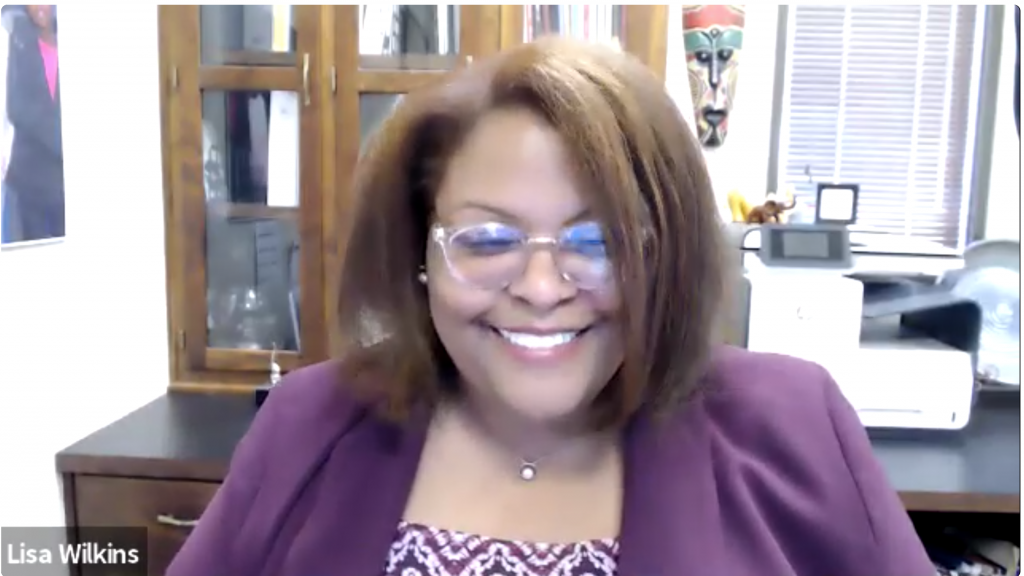
When asked if she would leave COA for a better position, Lisa Cooper Wilkins invited people to look into her background and see that she has a commitment to longevity.
“When I make a commitment to an institution, I don’t just make a commitment to the institution. I make a commitment to the community, the surrounding community, because those are, you know, the folks that we serve,” Wilkins said.
The Collegian, the student publication of San Joaquin Delta Community College — where Wilkins is currently the assistant superintendent/vice president for student services — published over 15 articles about the college’s PeopleSoft rollout, dubbed “MyDelta.” The articles explain that when MyDelta went live, the program created many problems for faculty, staff and students. When the publication submitted a Freedom of Information Act public records request for college communications related to the controversial rollout of MyDelta, they learned about how faculty members were “grasping for understanding of the new system and struggling with the issues it introduced into the start of the semester,” one Collegian article reported. As the college handed over public records to the publication, they also inadvertently released student records that included “names, identification numbers, and, in some cases, course grades, grade point averages, home addresses, waiting list registrations dates, Delta email addresses and a student transcript,” according to a Collegian article.
Wilkins admitted to the rollout being tough for the entire Delta College community and referred to MyDelta as “PeopleHard software.”
“If I had a magic wand and could go back, I would strongly recommend having a separate team for implementing core areas,” Wilkins said.
“So I think that the students who have written about those challenges certainly are accurate, and were probably writing mainly from their perspective, but those perspectives would have been shared by the staff that was experiencing the implementation.”
Wilkins is currently the assistant superintendent and vice president for student services at San Joaquin Delta College with administrative oversight over enrollment services and student development as well as many other services. Wilkins has held positions at San Joaquin Delta College, University of the Pacific and College of Philadelphia. In addition to College of Alameda, Wilkins has been a finalist at Woodland Community College and is currently also a finalist for Laney College president.
Watch the forum with Wilkins here.
Don Miller
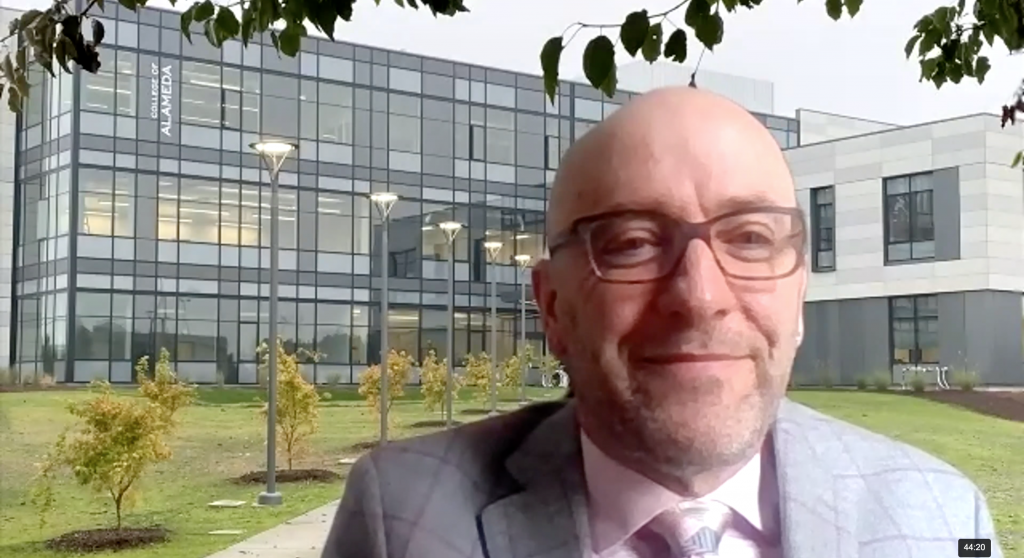
After about 18 minutes, Don Miller finished introducing himself, opened the platform up to questions and was asked about his commitment level to Peralta.
“At this point, there is no intention to move anywhere, especially if I’m selected as the president of the college, because I agree with President Rawlins that the college needs continued leadership and stability,” Miller said, adding that he is a wise choice.
“I’ve been in colleges where there’s a constant turnaround in executive leadership, and then you have to bring in a new president, and explain to them everything that we’re doing, and then try to help them with their vision to help the college move forward,” said Miller, who has been serving as interim COA president since June.
Miller was questioned about what difference he saw in mounting accreditation pressure at Peralta versus the various other campuses he has experience with.
The difference is that some accreditation concerns have been beyond Peralta’s control, Miller said. “And that’s just the reality of the type of district we are. And [because] we can’t necessarily affect direct changes there, we have to support the district itself in making changes in its fiscal practices or others that really would help the college move forward in this way. So we face a unique scenario where there are some things we can do as a college, but others, we depend entirely on the district.”
Miller currently serves as interim president at College of Alameda, a role he assumed after former president Tim Karas left to become president/superintendent at Mendocino Community College. Miller joined COA in 2018 when he became vice president of instruction. He also serves as the president elect of the California Community Colleges Chief Instructional Officers organization. Previously, he was the dean of arts and humanities and learning communities at Las Positas College, as well as a finalist for their president position.
Watch the forum with Miller here.
Christopher Villa
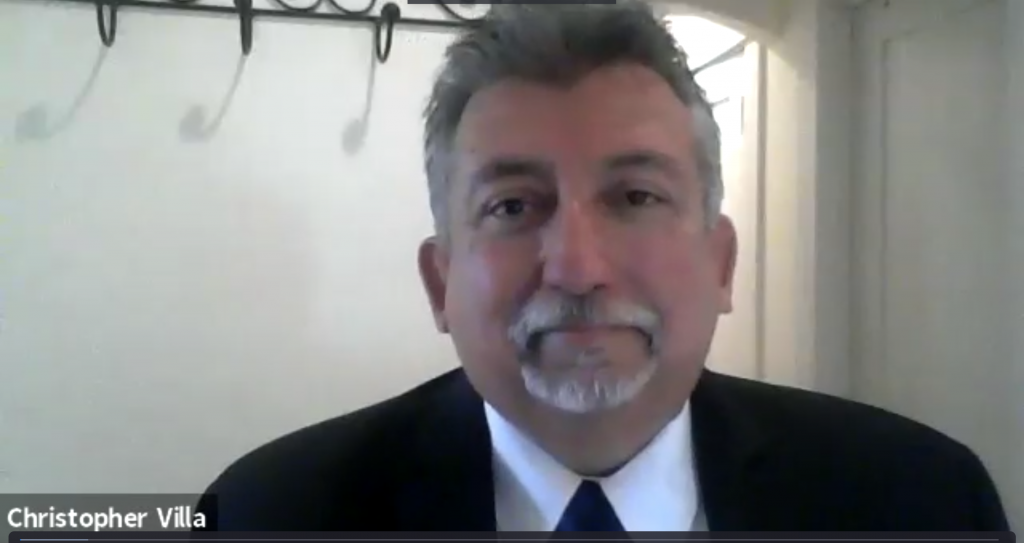
Christopher Villa emphasized his commitment to social justice, the need for supporting strong minority communities at College of Alameda and creating lasting changes that will increase enrollment. Villa added that he has experience increasing enrollment, and that he helped spur enrollment in Oregon where he was president of a community college. After a brief introduction, Villa told moderator Johnson he was ready to hear from the audience.
In response to Rawlins’ commitment question, Villa emphasized that COA is where he wants to be now and well into the future.
“If I were to accept this position, I’m not going in with the understanding that there’s a better position available. And when you look at my career path, I’m at a point in my career where I’ve been in higher education for quite a while. I have quite a bit of experience, and I’m not in a position to use COA as a stepping stone,” Villa said.
According to his LinkedIn profile, Villa has served at six different colleges. Assuming Villa leaves his current position, he will have stayed with half of those institutions for three years or fewer.
When asked about differences between the challenges COA is facing and the challenges his current college has faced, Villa touched on race, social issues and closing opportunity gaps.
“We’re very concerned about closing opportunity gaps at PCC Rock Creek,” Villa said of the community college in Oregon where he currently works.
“Also at COA, we’re very concerned about racial equity and social justice. Look at the city of Portland. It’s at the forefront of addressing these issues. And so is the city of Oakland, and Alameda next to Oakland is affected by that focus,” Villa said.
Being new to probation and accreditation issues, Villa also addressed those concerns.
“To be under probation status is quite a challenge. And it’s something that, of course, we’re all concerned about. So that’s new,” Villa said.
Villa served as campus president at Portland Community College-Rock Creek as well as vice president of student services at three California community colleges — Los Angeles Mission Community College, Fresno City Community College, and Long Beach City College.
Watch the forum with Villa here.
Nathaniel Jones III
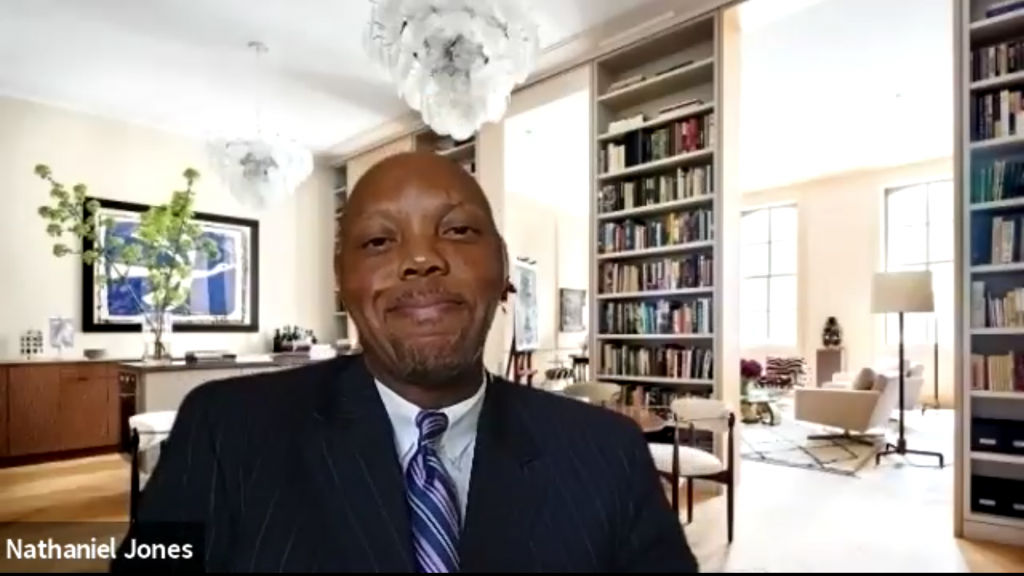
When asked about his commitment to COA if selected, Nathaniel Jones III gave specific answers and referenced his experience with previous roles.
“I typically am at an institution from five to seven years. The notable exception was when I was in a grant-funded position — and when the funding ended, I needed to leave and there was no opportunity [to stay],” Jones said.
When the issue of accreditation came up, along with the possibility of state takeover, Jones did not take a stance on how a state takeover would affect COA.
“To answer your question, it really depends on what the status quo is, and then how the external entity would change or disrupt that status quo,” Jones said.
“And so I have that know-how,” he said, in reference to his previous positions. “I think that I work really, really well with a number of different people. And so I think I could navigate that pretty well, understanding what the requirements are, and how we can come together to address those things.”
Jones currently serves as the vice president of business services at Moreno Valley College of the Riverside Community College District. According to his bio, he has held both faculty and administrative positions at University of California, Riverside, Pepperdine University, Dartmouth College, Northern Arizona University and the University of Maryland.
Watch the forum with Jones here.
~~~
Laney College Forums
Wei Zhou
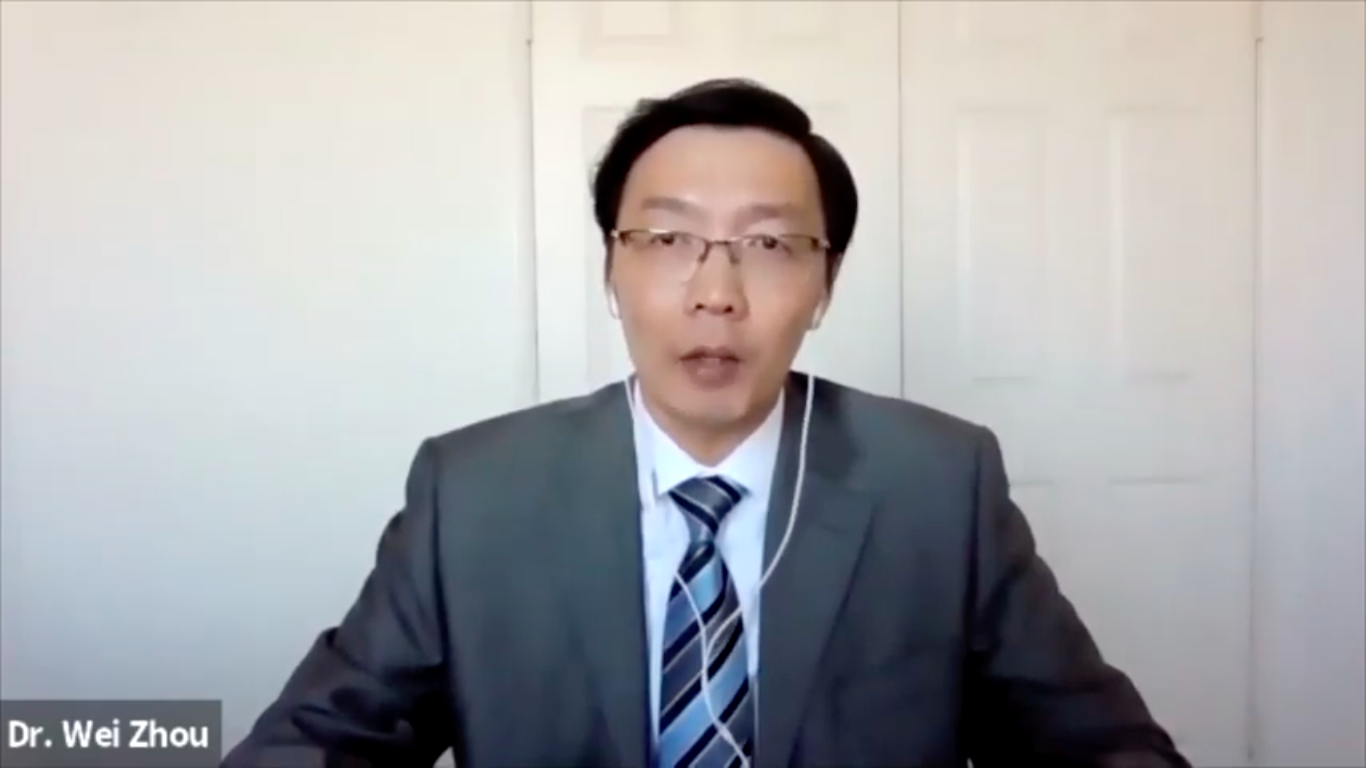
When asked about commitment to Laney College, Zhou gave a long answer that touched on the importance of relationship-building between the chancellor and the new president, citing his previous experience at other colleges as a point of reference.
“We want to have a district chancellor also, who is committed to it the district, who is committed to working with us, working with the board, working with the community, and campus level, we want to have a leader who’s coming in who’s committed to the community, who sees the community as his or her own community, who cares to work with every student, every faculty classified, the administrators, and folks in the community,” Zhou said. “I want to conclude that I’m committed to the community, working with you folks I’ve been connected to, and so on. And especially the population I care most about, I want to be here for a long time.”
According to an article from Inside Higher Ed, Zhou was placed on administrative leave at Crafton Hills College in March 2018. Zhou agreed that reading the article without background information would be concerning.
“I can tell you there’s no wrongdoing from me for sure. I was not dismissed for cause. There was truly a difference in leadership philosophy. And what I have learnt really, is to keep my collaborative involving leadership style, even if sometimes it can be perceived as time consuming and less efficient,” Zhou said. “I want to return to a home community where there is more diversity and commitment to equity.”
The Citizen submitted a question regarding interactions with student media to every Laney candidate. In terms of communication, promoting transparency and his experience with student media, Zhou said he wants to be as accessible as possible, although admitted that it may sometimes take a reasonable planning process.
“If you want to make an appointment and see me, right, and in the next two, three hours, that may not be possible, we may need to make an appointment two days ahead,” Zhou said. “A student voice is very important for us. If we want to truly stay student centered, learner centered institution, we want to hear from the students. So student newspapers can be a venue to help us get there, where I am committed to go attend student government meetings, making sure students are represented in our participant governance processes.”
Wei Zhou has served as dean of math, science and engineering at Evergreen Valley College, vice president of instruction and interim president at Cuyamaca College and president of Crafton Hills College.
Watch the forum with Zhou here.
Kenneth Gonzalez
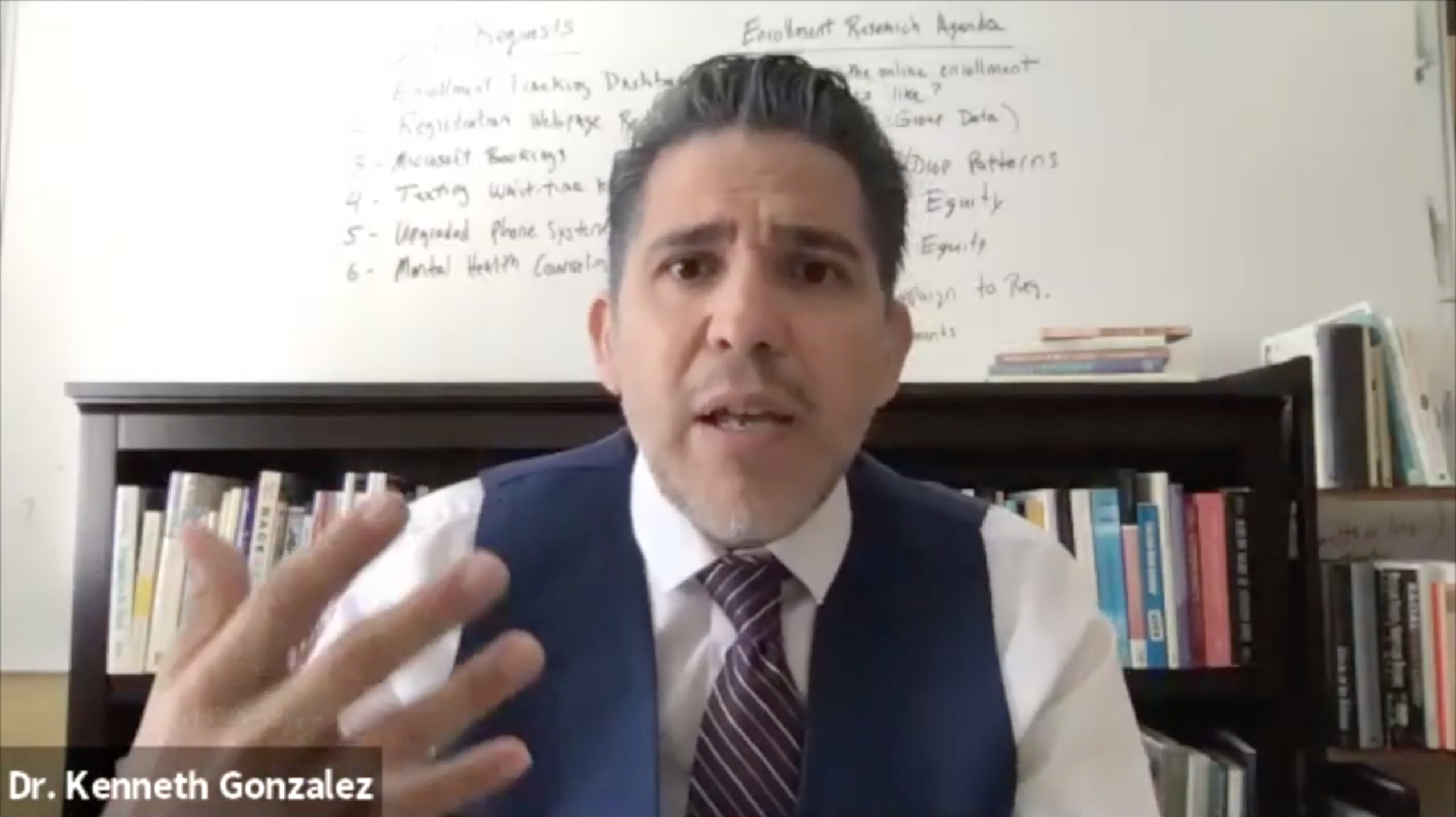
Kenneth Gonzalez is familiar with the executive turnover at Peralta, and explained during his forum that he watches board of trustees meetings, has read chancellor and Fiscal Crisis Management Assistance Team (FCMAT) reports and has reviewed accreditation documents. He expressed his commitment to understanding the challenges the district and Laney College face.
“Right now, in my career, I am looking to be somewhere long term, to really be there to commit, to be able to be someone the college can rely on that where there can be some consistency and integrity, and collaboration, the sense of community. That takes years. I’m ready to commit to that,” Gonzalez said.
When reflecting on his experience, Gonzalez touched on a career mistake he made as the communication liaison officer. The school had issues with program review and learning outcome assessment. When the policies and training he implemented didn’t work, Gonzalez started over.
“If I try something that doesn’t work, I’m not going to force it. You look for other alternatives,” Gonzalez said. “I realized as a leader that you can only go as fast as effectiveness demands, you can’t rush effectiveness.”
Gonzalez touched on the importance of journalists and their role in our society. He explained it is the job of journalists to ask tough questions, keep communities informed and keep people honest.
“History has proven that we can, as human beings, go astray if we don’t have different things that hold us accountable. And journalists hold people accountable,” Gonzalez said.
Gonzalez was one of three finalists for president at Norco College in February according to an article in Viewpoints, Riverside City College’s student-run publication.
According to Gonzalez’s’ Linkedin, he has approximately 20 years of experience working in higher education. Gonzalez served as vice president of student and enrollment services at El Paso Community College, president and CEO at AI Campus Solutions, a national pathways coach at Achieving the Dream, and associate vice president of academic affairs at Our Lady of the Lake University. Gonzalez is also a published author, and his finalist biography states that he is a national expert on institutional effectiveness in higher education.
Watch the forum with Gonzalez here.
Lisa Cooper Wilkins
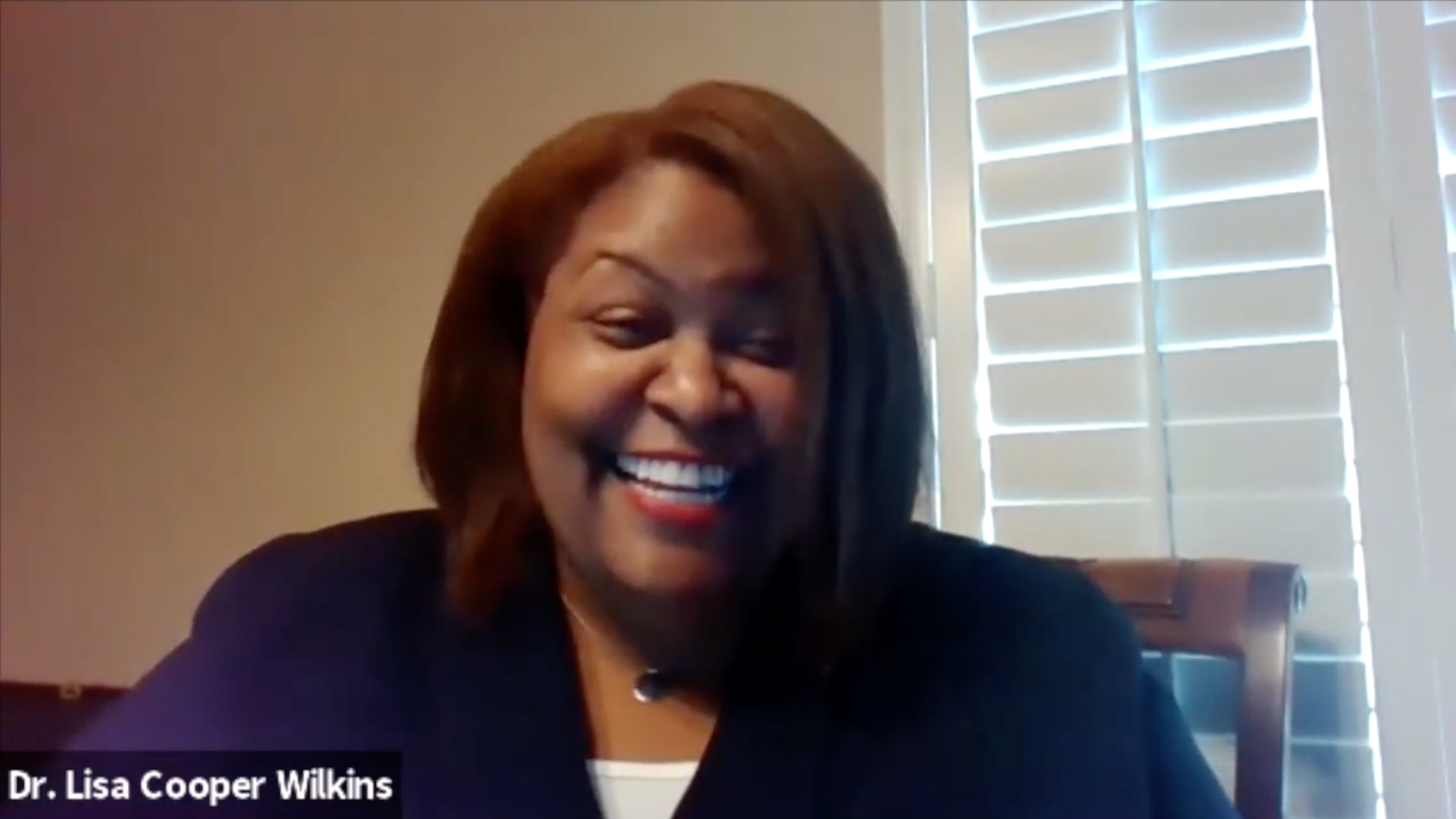
Lisa Cooper Wilkins gave background in both introductions, but when she presented herself at the Laney College forum, she went more in-depth about her experiences. She touched on a life-changing moment from her past: watching Waiting for Superman, a documentary about inequities in education and showing how some students have to endure a lottery process to access adequate education. Wilkins explained that she benefited from this system while her twin brother did not. She hopes to give better opportunities to Laney students, especially those from underserved communities of color.
Wilkens believes that her experience and fresh approach to Peralta will enable her to be a champion for underserved communities dealing with a variety of issues including gentrification and a lack of affordable housing, among many other challenges.
“I would challenge all of us, including myself, to be accountable to change those structures and barriers that have prevented our students from all being successful and enjoying equitable outcomes,” Wilkins said.
Wilkins emphasized the importance of student newspapers, noting it is a critical piece of communication and transparency as the student voice.
“[At Delta] we sort of worked out a process of really trying to engage our director of marketing and communication and ensuring that we get copies of the questions that the student reporters [wanted] us to answer so that we can be working on providing that detail. And ideally, you know, because if we can’t get the actual interview scheduled, right away, we can be at least getting the data ready,” Wilkins said.
Wilkins expressed the importance of shared governance and a good working relationship with the academic senate. She described some hardships at Delta for faculty and staff. “Being able to meet with [the] academic senate on a regular basis to discuss what those challenges are has been invaluable,” Wilkins said.
“I can reach out and say, ‘Hey, I’ve just been made aware that this is a challenge. And I want to talk through a strategy with you on how [I can] communicate this to the campus community, particularly to faculty or, you know, being able to be put on the academic senate agenda for the full meeting to come and talk to the senators.’”
On October 22, Wilkins’ name was on the City College of San Francisco Board of Trustees agenda as the candidate forwarded for consideration for their vice chancellor of student affairs position. The board voted unanimously to ratify Wilkins with an effective date to be decided. According to the agenda, Wilkins is set to earn between $136,793.45 to $231,984.26. The Citizen reached out to Wilkins for comment, but she did not respond by publication.
Watch the forum with Wilkins here.
Rudy Besikof
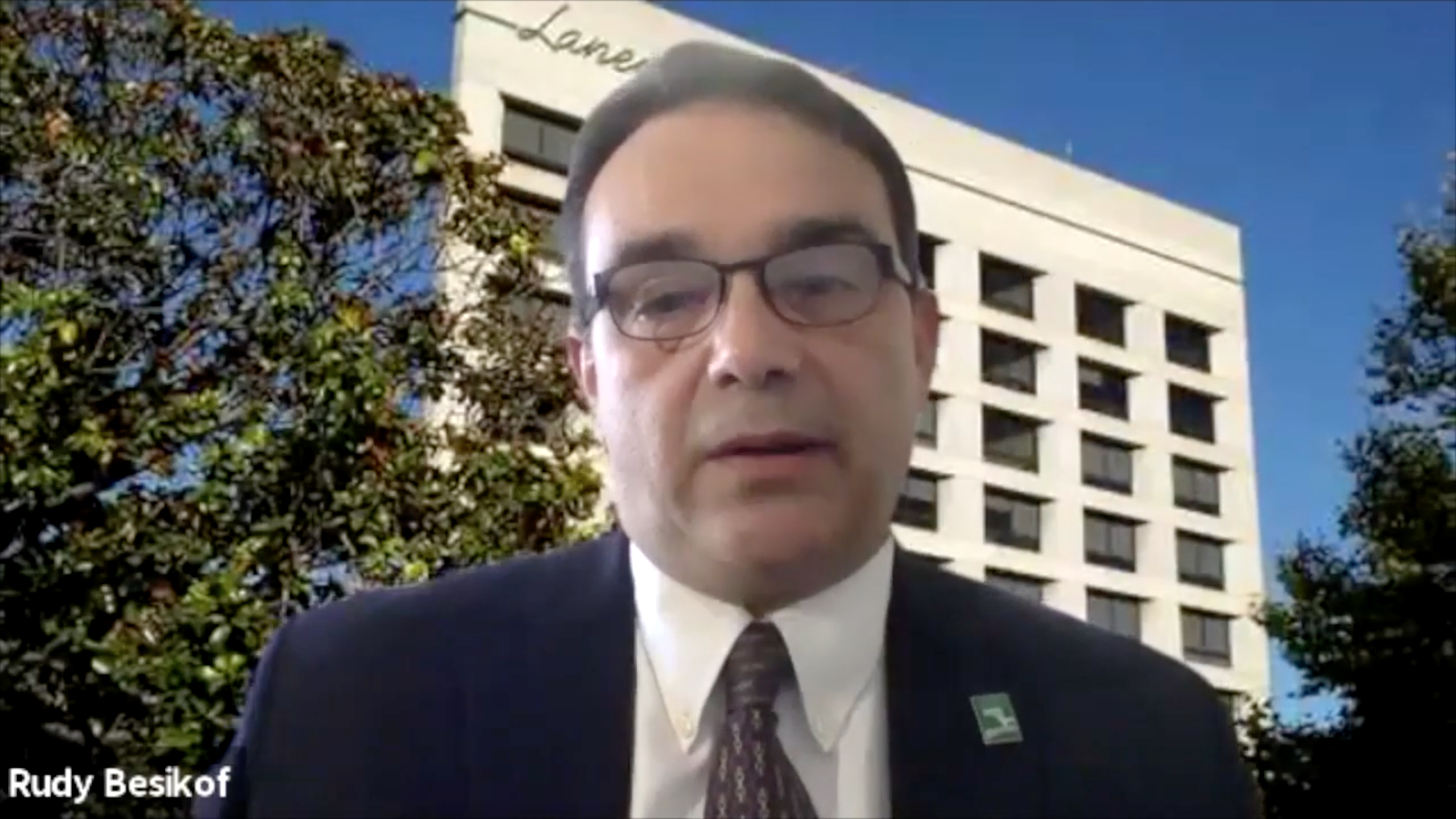
Rudy Besikof, who has been serving as interim president since July, said he hopes to join hands with the community and build lasting relationships by investing time and resources into Laney College. He plans to engage industry partners by continuing partnerships with companies such as East Bay Municipal Utilities District (EBMUD) and Union Bank in order to expand opportunities on campus. He wants to chase paid internships to help facilitate students’ career goals.
Reflecting on his own stint as a student reporter for his high school, Besikof emphasized the importance of First Amendment rights in terms of student voice and concerns. He boasted how the students of Laney are represented across shared governance committees.
“It’s so awesome that you go to the learning assessment committee, the strategic enrollment management committee, the budget advisory committee and when you do the roll call at the beginning of the meeting the student representation is in the room, that investment has been great in participatory governance,” Besikof said.
“Having the opportunity to have students exercise their freedom of speech that is afforded to any newspaper is something I support.”
Besikof explained that the college’s shuffle to navigate the pandemic resulted in some things being lost in translation. He recognized that he did not have organic responses to some of the problems that arose. With hopes of rectifying some of the urgent issues that have resulted from the pandemic, communication and fallout on campus, he referenced a listening session he held to let the campus update him on needs and concerns of students and faculty. His goal is to move away from emergency response to proactive planning and preparation.
“Along the way, no matter how great your deeds are or no matter how noble your intentions might be, your communication has to keep up with the moment, [and] that includes your communication style and being conscious of your audience,” Besikof said.
Besikof has served as Laney College acting and interim president, vice president of instruction and accreditation liaison officer. Before Laney, Besikof was a dean of instruction and learning resources, dean of languages and performing arts, vice president of instructional services and an English professor.
Watch the forum with Besikof here.
~~~
Following the forums, the community was invited to submit feedback to human resources about each candidate, in accordance with Administrative Procedure 7123, which governs administrative hiring. According to AP 7123, Interim Chancellor Carla Walter will select a candidate and forward a name for board approval. According to the district’s manager salary schedule, the future presidents of College of Alameda and Laney College are slated to earn between $172,931 and $219,046.
In a newsletter to the Peralta community on October 21, Interim Chancellor Carla Walter said the names of College of Alameda and Laney College’s new presidents would be forwarded for board approval during the November 10 meeting. According to a Board of Trustees preparation schedule, materials for the November 10 meeting were forwarded by October 22.

